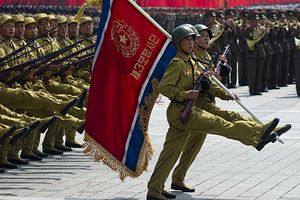Imagine that a Japanese solider (whether a deserter or on active duty) sneaks into China and kills four Chinese citizens in a robbery. How would the Chinese government, media, and public react to an incident like this?
Almost certainly, the Chinese government would immediately and publicly lodge a formal complaint with the Japanese government, the Chinese media would feature many front page stories about this incident, and the Chinese public would call for nationwide protests against Japan.
But not so with a North Korean soldier who, on December 28, killed four Chinese civilians in a border village. Some sources say this is not the first time that North Korean soldiers have crossed the border and committed such a crime against innocent Chinese. Yet the Chinese government has consistently tried to cover up such incidents, due to the sensitivity of China-North Korea relations in Chinese domestic politics. In fact, North Korea has become a taboo in domestic discussions about Chinese foreign policy. What has gone wrong with this bilateral relationship?
China fought a bloody war on behalf of North Korea in the early 1950s, with Chinese casualties estimated to be over half a million. Because of the Korean War, the two countries have since been locked into an unusual political-military relationship that is characterized today by apparent mutual suspicion and resentment. While North Korea is widely believed to be a protégé of China, Beijing seems extremely reluctant to show off its special relationship with Pyongyang (unlike, for example, China’s relations with Pakistan). Thus North Korea may be called China’s “skeleton ally in the cupboard,” a weapon of mass destruction to China’s image and reputation in the international community.
If so, why have Chinese leaders refused to adopt fundamental changes in their policy toward North Korea, despite increasing calls by some Chinese analysts to do so? Opponents of such changes argue that to cut off Chinese political and economic support could lead to the collapse of the North Korean regime, and that China would probably face an unprecedented humanitarian crisis on its border. Additionally, they contend that as long as the Korean Peninsula remains divided, a North Korea under Chinese influence will be an invaluable buffer against U.S. troops stationed in South Korea.
Well, these are certainly important strategic reasons for Beijing’s continued — if not unconditional — support for Pyongyang, but the most important reason appears to be rooted in Chinese domestic politics. To “abandon” North Korea is to admit that the Korean War was a mistake. Who made that mistake and why? Answers to these questions — and many others — will require Chinese leaders to step down from the altar of inviolable authority and to disclose to the Chinese people many inconvenient truths about the war. More importantly, if inconvenient truths about the Korean War are disclosed, the Chinese people will probably demand to know similar truths about other episodes since 1949, such as the Great Leap Forward and the Cultural Revolution. What these disclosures could lead to is anybody’s guess.
In this sense, North Korea is the singular test case for China’s new leadership. Within a little more than two years, President Xi Jinping has managed to put his personal imprints on nearly every aspect of Chinese foreign policy, with North Korea being a conspicuous exception. If Xi has the will, courage, and ability to implement policy changes that would normalize China-North Korea relations, the world will be witnessing not just a truly new era of Chinese foreign policy, but also a truly new generation of Chinese leadership. Given increasingly unfavorable views of North Korea among the Chinese public, and in light of U.S.-Cuba rapprochement, a fundamental shift in China’s North Korea policy is both desirable and urgent.































